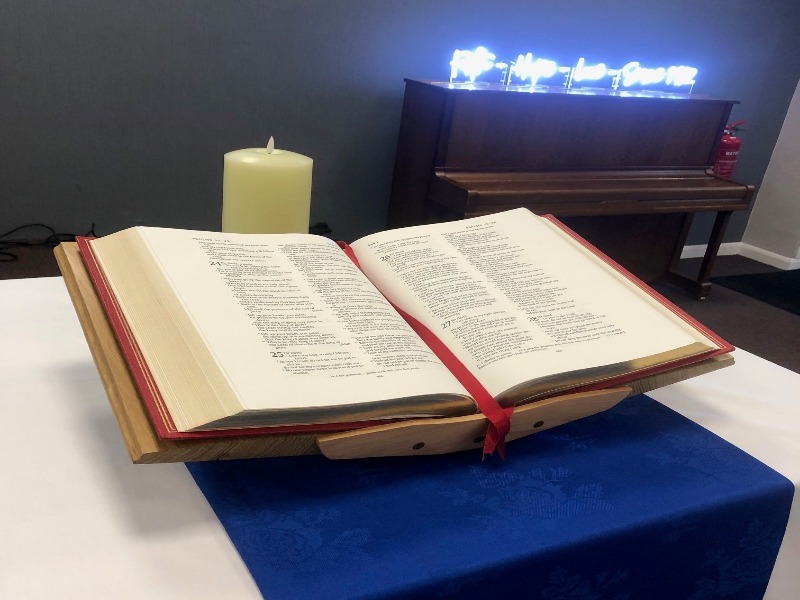The Revd Lindsey Sanderson, Chaplain to the General Assembly Moderator, opened the final day of Assembly Executive’s autumn meeting with prayers.
There followed an acknowledgement by the Revd Fiona Bennett, General Assembly Moderator, of how some members were hurt by the reflection in opening worship on day two of Assembly Executive, and how it made some felt not safe within the URC. This was not the intention. In a way, Fiona added, the sermon provided the opportunity for open conversation and for listening to each other.
Session nine
Paper N1
Church Life Review (CLR) update
The Revd Dr John Bradbury offered an overview of the group’s work in hand and reflected on the responses to the structures consultation.
He said that the CLR process has reached ‘an Advent moment’– quite a lot of waiting is going on for different elements of the process to be concluded. He said, we want to know what the end point is but that, if we’re going to trust the process, we have to maintain a position of alert, expectant waiting – anticipating that God’s vision will emerge. As yet, there is no concrete process in front of us.
Dr Bradbury said that research by external organisations will give us a chance to see ourselves as others see us. In conversations with local selected local congregations, the lead researcher from Theos has already been struck by what extraordinary things small congregations can do; and noted that those congregations that are thriving in the URC tend to be those that are engaged with communities around them. Some quantitative research is being added into the research process.
Responses to the Jubilee initiative Tending the Vineyard (what ‘tending’ would enable the URC to be more healthy and fruitful?) have been received and will be collated as soon as possible.
Initial conversations have taken place concerning resources to enable reflection on a theology of money, with the aim of making this work available for General Assembly 2023 and providing a theological grounding for other CLR work. Dr Bradbury observed that, as a denomination, the URC appears never to have reflected on how we ourselves use money.
Ms Mel Campbell, synod clerk Northern Synod, spoke about the process of collating financial information from across the Church. Every synod has completed a template of information, and templates have been completed for the General Assembly and Church House. Ms Campbell said that, for the very first time, the URC has created an overall picture of the Church’s financial position. The aggregated position (and not the information from individual synods) will be presented in a way that suits different audiences.
In February 2023, synod representatives are being invited to a consultation on the results gathered from the forensic accounting process in order to discuss our resources and how we might use them – together with matters being worked on by the law and polity group. Some online sessions will take place for people to ask technical questions prior to meeting in person.
Ms Campbell concluded by saying: ‘Only when we know what we have together now can we begin to craft what we could do in the future.’
Responding to a question, Ms Campbell said that only some of the gathered financial information is available in the public domain, and that the process had gathered management information not otherwise available. One representative expressed concern about synods not being prepared to share information with other synods; Ms Campbell said this hasn’t happened and that synods have simply not been asked to give that kind of permission.
Dr Bradbury added that there aren’t predetermined solutions which the data is being used to support; rather, this is a process from which possible solutions will emerge. To another question, he acknowledged that there are immediate pressures (such as felt by the Nominations Committee) which require some work on the structures – but these structures will be designed to help the Church discern a vision for the future. He also said that financial information from local churches is ‘hard to get to’. Dr Bradbury indicated that, though we may think of ourselves as a small church compared with our ecumenical partners; within the charity sector, the URC is quite wealthy overall.
Turning to further discussion about a possible committee structure, Dr Bradbury said a first iteration for consultation will be ready in early January 2023. He said this thinking is about supporting the frontline mission of local churches and about providing integrated decision making instead of working in silos. ‘We’re trying to reduce from around 500 the number of people needed to populate the committee structure.’ He indicated a lack of ‘joined upness’ (e.g. staffing decisions are taken separately from other budget decisions, despite staffing making up a high proportion of the overall budget). There is a need to ensure that committees work at the level of strategy, policy and governance, not engaging with operational decision making.
In a separate point, with respect to overseeing equality, diversity and inclusion in, the question emerging is: ‘What does a really effective EDI policy for the URC look like, and how do we resource that?’ More generally, the CLR group would welcome thoughts on how we make up committees: how to be fully representative without making a committee too large.
Assembly Executive closed with worship.
Reporting team: Andy Jackson, Ann-Marie Nye, Stephen Tomkins, Laurence Waring

